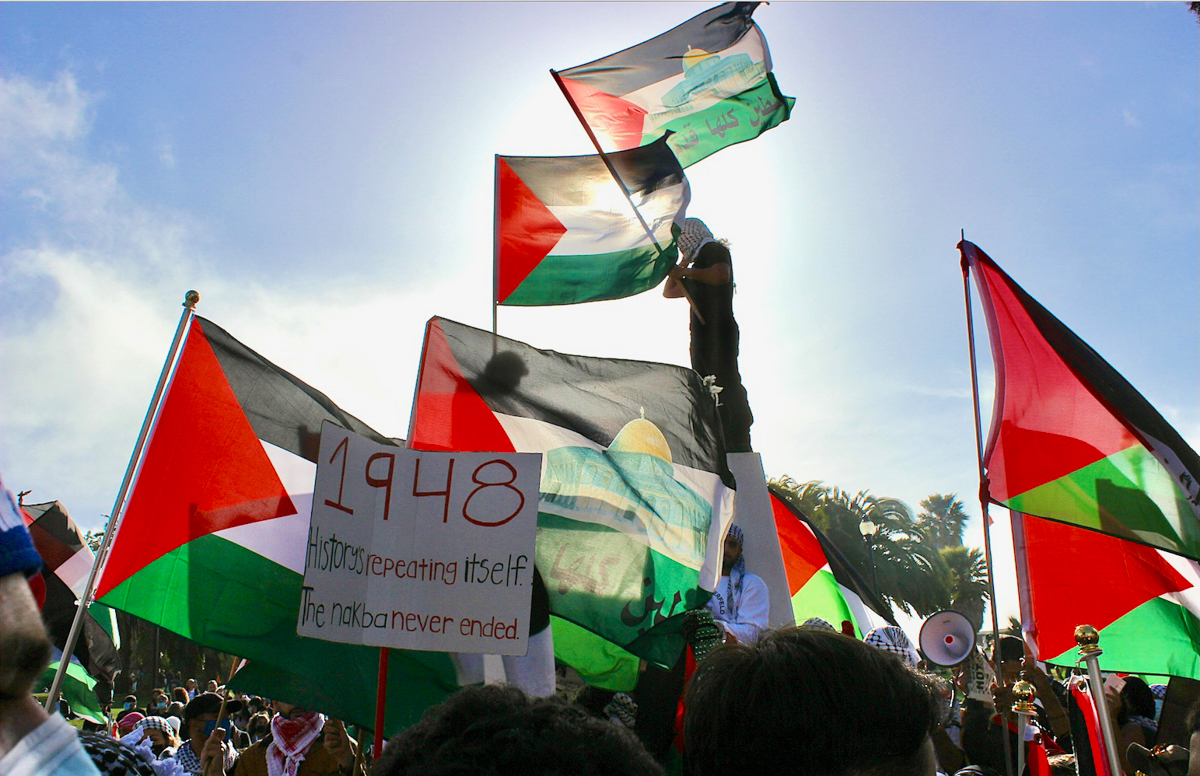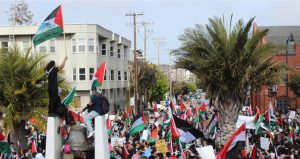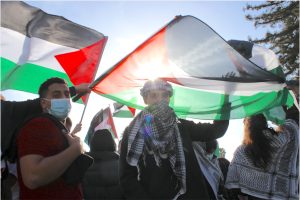Activism
Thousands March in San Francisco to Support Palestine
The San Francisco march appeared as a vast sea of red, black, white, and green, as protesters waved Palestinian flags in those colors that had been provided by organizers.


Protestors wave flags and signs in support of Palestine and against the Israeli occupation in San Francisco’s Dolores Park on May 15. Photo by Zack Haber.

Abdul (left) and Rami (center), stand at a protest in San Francisco’s Dolores Park to support Palestinians and against the Israeli occupation on May 15. Photo by Zack Haber.
On Saturday, thousands gathered in San Francisco’s Mission District at 2:00 p.m. to march in support of Palestine and against the Israeli occupation of Palestinian land.
“It gives me hope that people are waking up who didn’t know about this issue, including people who used to be Zionists, but just can’t find it defensible anymore,” said San Francisco resident Saif Haddad as he stood on a trash can gazing out into a densely packed marching crowd that covered more than four city blocks.
Haddad told The Oakland Post that his grandmother was forced from her homeland in Palestine in 1948. Since then, she has not been allowed to return. Haddad himself has never been able to visit the land where his ancestors once lived.
The march was organized in part in response to the state of Israel’s recent attacks on Palestine. On Monday following the march, Democracy Now! reported that over a two-week period ending on Sunday, Israeli attacks killed over 200 Palestinians including over 50 children, injured over 1,300 and left over 40,000 Palestinians homeless.
The march also responded to the history of Israeli occupation by occurring on Nakba Day, an annual day of commemoration for Palestinians marking the day after the British government formally declared the end of its mandate to recognize the state of Palestine, recognizing Israel in its place on May 14, 1948. Beginning in 1949, Palestinians have commemorated Nakba Day every May 15th with remembrance and protest.
“For my family, Nakba is about why we are here and not our homeland,” said Rami, a Palestinian teenager living in San Ramon who attended the march. Rami’s grandparents were originally displaced from their home in 1948, then bounced back and forth between Lebanon and different parts of Palestine before moving to the United States in the late 1960s.
Rami said that the march was one of the happiest things he had ever been a part of and that he’d not seen so much awareness for Palestine since he was born. He also noted broad national and international support. An article appearing in Buzz Feed News documented other pro-Palestine protests on May 15 in Paris, Tokyo, Madrid, Wash., D.C., Canada, Ireland, Mexico, and London, where organizers say about 100,000 supporters showed up. In Los Angeles, thousands showed up to a march to free Palestine in the Westwood neighborhood, where they stalled traffic.
The San Francisco march appeared as a vast sea of red, black, white, and green, as protesters waved Palestinian flags in those colors that had been provided by organizers. Before the march started, about 50 Palestinians and supporters painted a giant circular street mural on Valencia Street that Palestinian artist Chris Gazaleh had sketched out. It included symbols supporting Palestine such as women wearing keffiyeh scarves, red poppy, and the Palestinian flag with the words “we will return” in Arabic and English.
While many Palestinians came to the march, the crowd was diverse and supporters from many different backgrounds joined them. A young Palestinian child held a sign that read “SAVE THE CHILDREN OF PALESTINE” while a Jewish man from Berkeley in his late 60s carried a sign that read “SON OF HOLOCAUST SURVIVORS AGAINST ISRAEL’S RACIST OCCUPATION.” An indigenous person held a sign that read “NATIVES 4 PALESTINE.”
The march was loud. Drummers and organizers lead chants and the crowd yelled in response. A few were in Arabic, one of which, according to a Palestinian protestor, translated to “with our life, with our blood, we will sacrifice for Palestine.”
Most chants were in English, including one where protestors yelled “not another nickel, not another dime, no more money for Israel’s crimes.” This chant referred to the $3.8 billion that the United States has been sending to Israel every year since 2016, which has continued under President Joe Biden, who recently approved $735 million in weapons sales to Israel. One marcher held a sign which read “Stop US Aid to Apartheid Israel.”
After marching for about two miles in the Mission District, the protestors entered Dolores Park. There, members of the local anti-Zionist groups spoke.
Monadel Harzallah, a Palestinian member of the United States Palestinian Community Network, said “We have no illusions about the US administration here. It doesn’t matter if they disagree with racist Trump, they are following his footsteps when it comes to Israel.”
Continuing, Harzallah accused Biden of not having the courage to reverse any of Trump’s policies in relation to Israel.
Allison Tanner, a Baptist pastor from Oakland and a member of Friends of Sabeel North America, a Christian group seeking peace in Palestine through an end to the U.S.-supported Israeli occupation, said, “We know that Christian Zionists are wielding their power in Washington to help fund and provide political cover for Israel’s war crimes. We are here to decry the evils that they are doing in the name of Christianity and to commit ourselves to challenging Christian Zionism in all its ugly forms.”
Liza Mamedov, of the Jewish anti-Zionist activist group Jewish Voice for Peace, said “The state of Israel has always required, at every step, the forced displacement, racist oppression, fascist surveilling, occupation and apartheid; in one word: genocide against the Palestinian people. As colonized people living under brutalized occupation and siege, Palestinians are overwhelmingly justified in resisting their oppressors by any and all means necessary.”
Members of The Palestinian Youth Movement and Black Alliance for Peace also spoke. The protest started winding down around 6:00 p.m., when Palestinians and supporters left Dolores Park. Hours later though, small groups of people, most of whom appeared to be teenagers or in their 20s, could still be seen driving around the Mission District, honking horns and cheering as they waved Palestinian flags.
Activism
Oakland Post: Week of April 24 – 30, 2024
The printed Weekly Edition of the Oakland Post: Week of April 24 – 30, 2024

To enlarge your view of this issue, use the slider, magnifying glass icon or full page icon in the lower right corner of the browser window. ![]()
Activism
Oakland Post: Week of April 17 – 23, 2024
The printed Weekly Edition of the Oakland Post: Week of April 17 – 23, 2024

To enlarge your view of this issue, use the slider, magnifying glass icon or full page icon in the lower right corner of the browser window. ![]()
Activism
Oakland Schools Honor Fred Korematsu Day of Civil Liberties
Every Jan. 30, OUSD commemorates the legacy of Fred Korematsu, an Oakland native, a Castlemont High School graduate, and a national symbol of resistance, resilience, and justice. His defiant stand against racial injustice and his unwavering commitment to civil rights continue to inspire the local community and the nation. Tuesday was “Fred Korematsu Day of Civil Liberties and the Constitution” in the state of California and a growing number of states across the country.

By Post Staff
Every Jan. 30, OUSD commemorates the legacy of Fred Korematsu, an Oakland native, a Castlemont High School graduate, and a national symbol of resistance, resilience, and justice.
His defiant stand against racial injustice and his unwavering commitment to civil rights continue to inspire the local community and the nation. Tuesday was “Fred Korematsu Day of Civil Liberties and the Constitution” in the state of California and a growing number of states across the country.
One OUSD school is named in his honor: Fred T. Korematsu Discovery Academy (KDA) elementary in East Oakland.
Several years ago, founding KDA Principal Charles Wilson, in a video interview with anti-hate organization “Not In Our Town,” said, “We chose the name Fred Korematsu because we really felt like the attributes that he showed in his work are things that the children need to learn … that common people can stand up and make differences in a large number of people’s lives.”
Fred Korematsu was born in Oakland on Jan. 30, 1919. His parents ran a floral nursery business, and his upbringing in Oakland shaped his worldview. His belief in the importance of standing up for your rights and the rights of others, regardless of race or background, was the foundation for his activism against racial prejudice and for the rights of Japanese Americans during World War II.
At the start of the war, Korematsu was turned away from enlisting in the National Guard and the Coast Guard because of his race. He trained as a welder, working at the docks in Oakland, but was fired after the bombing of Pearl Harbor in 1941. Fear and prejudice led to federal Executive Order 9066, which forced more than 120,000 Japanese Americans out of their homes and neighborhoods and into remote internment camps.
The 23-year-old Korematsu resisted the order. He underwent cosmetic surgery and assumed a false identity, choosing freedom over unjust imprisonment. His later arrest and conviction sparked a legal battle that would challenge the foundation of civil liberties in America.
Korematsu’s fight culminated in the Supreme Court’s initial ruling against him in 1944. He spent years in a Utah internment camp with his family, followed by time living in Salt Lake City where he was dogged by racism.
In 1976, President Gerald Ford overturned Executive Order 9066. Seven years later, the 9th Circuit Court of Appeals in San Francisco vacated Korematsu’s conviction. He said in court, “I would like to see the government admit that they were wrong and do something about it so this will never happen again to any American citizen of any race, creed, or color.”
Korematsu’s dedication and determination established him as a national icon of civil rights and social justice. He advocated for justice with Rosa Parks. In 1998, President Bill Clinton gave him the Presidential Medal of Freedom saying, “In the long history of our country’s constant search for justice, some names of ordinary citizens stand for millions of souls … To that distinguished list, today we add the name of Fred Korematsu.”
After Sept. 11, 2001, Korematsu spoke out against hatred and discrimination, saying what happened to Japanese Americans should not happen to people of Middle Eastern descent.
Korematsu’s roots in Oakland and his education in OUSD are a source of great pride for the city, according to the school district. His most famous quote, which is on the Korematsu elementary school mural, is as relevant now as ever, “If you have the feeling that something is wrong, don’t be afraid to speak up.”
-

 Activism4 weeks ago
Activism4 weeks agoOakland Post: Week of March 27 – April 2, 2024
-

 #NNPA BlackPress4 weeks ago
#NNPA BlackPress4 weeks agoBeloved Actor and Activist Louis Cameron Gossett Jr. Dies at 87
-

 Community1 week ago
Community1 week agoFinancial Assistance Bill for Descendants of Enslaved Persons to Help Them Purchase, Own, or Maintain a Home
-

 Activism3 weeks ago
Activism3 weeks agoOakland Post: Week of April 3 – 6, 2024
-

 Business2 weeks ago
Business2 weeks agoV.P. Kamala Harris: Americans With Criminal Records Will Soon Be Eligible for SBA Loans
-

 Activism2 weeks ago
Activism2 weeks agoOakland Post: Week of April 10 – 16, 2024
-

 Community2 weeks ago
Community2 weeks agoAG Bonta Says Oakland School Leaders Should Comply with State Laws to Avoid ‘Disparate Harm’ When Closing or Merging Schools
-

 Community7 days ago
Community7 days agoOakland WNBA Player to be Inducted Into Hall of Fame






















































